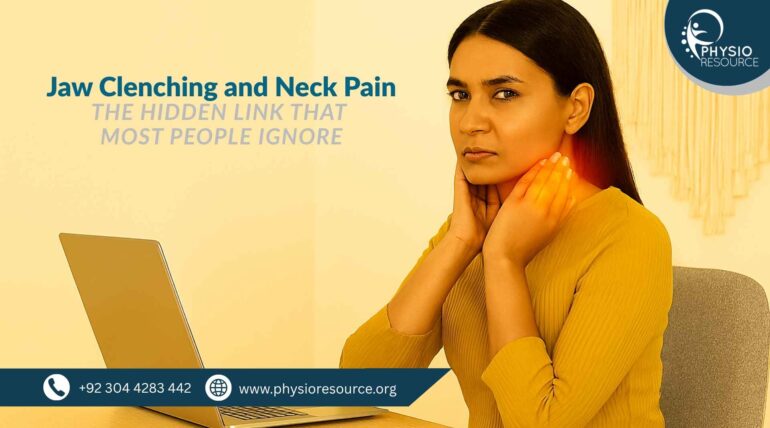
Has it ever happened to you that you wake up in the morning and you feel neck tightness, headaches or sore jaws… but you never considered that your night-time clenching or stress-related clenching could actually be the main culprit of your neck pain? To your surprise, the science confirms that the jaw and neck muscles are very much interconnected. If you are a teeth clencher (the medical term is bruxism), then the muscles underneath your skull, the jaw joint (TMJ), and the upper part of the spine will all get overstressed. As a result, you may experience referred pain in the neck, headaches, shoulder discomfort, and even occasional dizziness.
Most patients keep on getting massages, taking painkillers, and doing scans… but the pain comes back after a few days because the real cause remains untreated. The current article will point out the connection between teeth grinding and neck discomfort, will reveal the role of stress and bad posture in exacerbating the condition, and will tell you how physiotherapy at Physio Resource (the top physiotherapy clinic in Gulberg, Lahore) can go about addressing the issue professionally.
How Jaw Clenching Results in Neck Pain
The masseter, temporalis, sternocleidomastoid (SCM), and suboccipitals are some muscles that connect your jaw to your skull and neck. If you clench your jaw, especially during stress or while sleeping, these muscles will become overactive and will be constantly pulling the neck into tension.
Typical Symptoms
- Pain & stiffness of the neck (upper neck in particular)
- Tenderness around the jaw joint (TMJ)
- Headaches (mainly in temples or forehead)
- Pain when chewing or yawning
- Ear pain, jaw clicking, or jaw locking
Primary Reasons for Jaw Clenching
- Stress / anxiety
- Grinding teeth at night
- Poor sitting posture (low laptop, cellphone use)
- Misaligned bite / uneven teeth
- Poor breathing habits (mouth breathing)
Most Relevant: TMJ (JAW) Dysfunctions Treatment in Lahore
How Physiotherapy Helps (Evidence Based)
At PhysioResource, the top physiotherapist in Lahore uses advanced treatment methods to change this pain cycle:
Best physiotherapy Treatment in Lahore
- Release of trigger points in jaw and neck muscles
- Myofascial release of TMJ muscles
- Correction of cervical posture
- Jaw relaxation training
- Dry needling to release muscle spasms
- TMJ mobilization techniques
- Stress-reducing breathing along with jaw resting posture training
Home Tips to Control Jaw Clenching
- Soft diet for some days
- Stop chewing gum
- Heat treatment on the jaw and neck
- Avoid resting your chin on your hand while sitting
- Practice the tongue-to-palate resting posture (the tongue lightly touches the upper palate)
Writer’s Introduction:
The author of this blog is Dr. Ahmad Bilal, An extremely proficient physiotherapist with a comprehensive focus on musculoskeletal pain, TMJ disorders, and neck spine biomechanical correction. Dr. Ahmad Bilal is characterized by a modern evidence-based clinical approach, and is one of Lahore’s best physiotherapists who treats the root cause rather than just providing temporary relief.
Schedule a TMJ / Neck Pain Assessment
Don’t overlook symptoms like jaw clenching, morning headaches, neck pain that lasts 2-3 days and then goes away, or clicking noises while opening the mouth — they typically get worse with time.
For specialized physiotherapy based on evidence and with a holistic approach, visit PhysioResource – The Top Physiotherapy Clinic in Gulberg, Lahore. We eliminate the root cause via advanced physiotherapy, manual therapy, dry needling, and posture correction plans. Make your appointment now and feel the difference of real long-term relief, not just the effect of painkillers.
Physio Resource
Phone No: 0304-4283442
Address: 93-A1, Gurumangat Road, Gullberg, III Lahore
Written by: Dr. Ahmad Bilal (Consultant Physiotherapist – MS NMPT, Spine & Posture Specialist)


